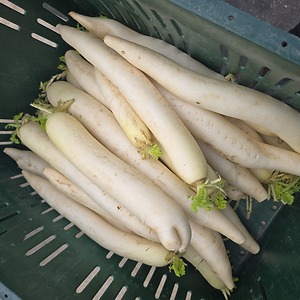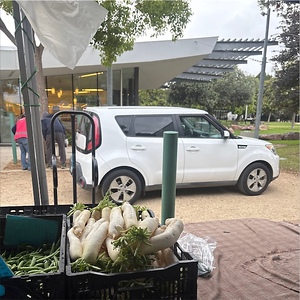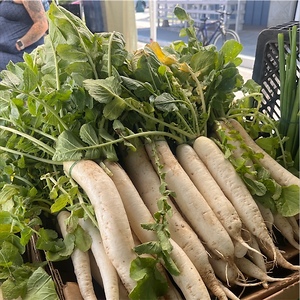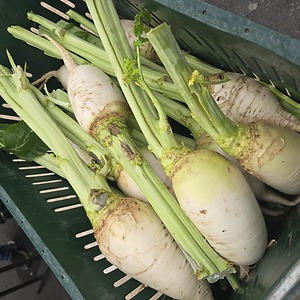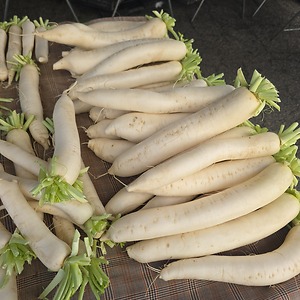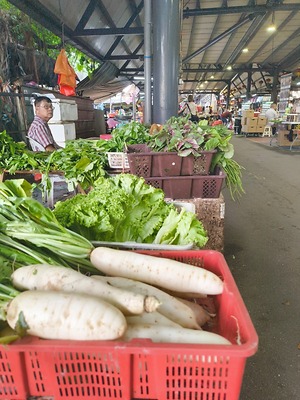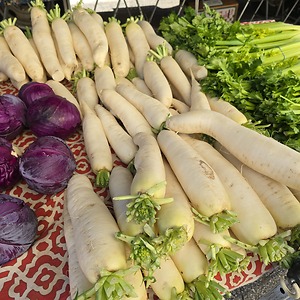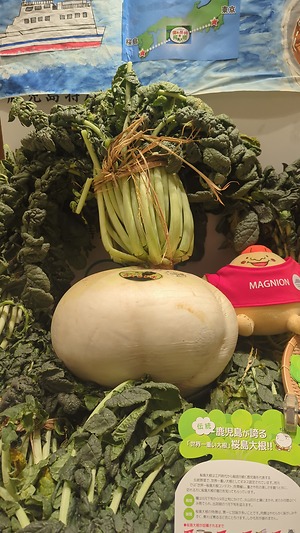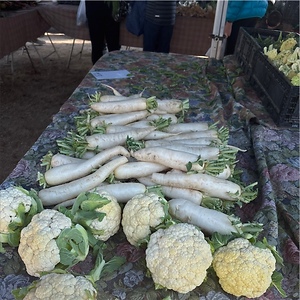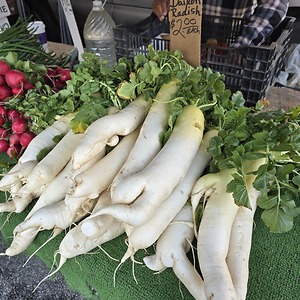


Daikon Radish
Estimated Inventory, 40 lbs : 5.23
This item was last sold on : 07/13/25
Description/Taste
Daikon radishes widely range in size, averaging 15 to 60 centimeters in length, and shape, typically having an elongated, cylindrical appearance, but also found in round to oblong forms, depending on the variety. The skin is firm, semi-smooth, and varies from pure white to purple, green and white, to solid red. The root generally feels heavy for its size, a sign that the flesh is plump and not dried out, and is also crisp, aqueous, and dense, containing white, purple, or red hues. Daikon radishes are known for their crunchy, snap-like texture when raw and contain a mild, semi-sweet, and peppery, tangy flavor. Once cooked, the flesh softens to a consistency similar to a potato and develops a neutral flavor. In addition to the roots, Daikon radish leaves are also edible and have a pungent, green, and grassy taste.
Seasons/Availability
Daikon radishes are available year-round, with a peak season in the fall through winter.
Current Facts
Daikon radishes, botanically classified as Raphanus sativus, are a mild-flavored root vegetable belonging to the Brassicaceae family. The name Daikon translates from Japanese to mean “great root” and is a general descriptor used to encompass over 100 different varieties varying in appearance and flavor. Daikon radishes can be grown year-round, but they are primarily considered a winter vegetable widely used in Chinese, Japanese, Korean, Indian, and Southeast Asian cuisine. In local markets, the radishes are commonly labeled as Daikon radish, but the roots are also known under Japanese radish, Chinese radish, Winter radish, Long White radish, and Asian radish. Daikon radishes are generally slower growing than spring radish cultivars, but the roots are highly favored for their versatility and mild, sweet, and peppery flavor.
Nutritional Value
Daikon radishes are an excellent source of vitamin C to strengthen the immune system, reduce inflammation, and boost collagen production within the skin. The roots are also a good source of potassium to balance fluid levels and contain lower amounts of phosphorus, copper, calcium, magnesium, and folate. In traditional Asian medicines, Daikon radishes are believed to provide enzymes that assist in the synthesis of starches and fats. The roots are steeped into teas and boiled with seaweed to fight infections, detox the body, and eliminate the harmful buildup within the digestive tract.
Applications
Daikon radishes have a mildly sweet and peppery flavor well suited for raw, cooked, and pickled preparations. The radish can be eaten with or without the skin, and when raw, the flesh can be thinly sliced, chopped, or cubed as a crisp side dish. In Japan, Daikon radishes are often served as a refreshing accompaniment to tempura and other deep-fried dishes as a reprieve from heavier flavors. Fresh slices are also served at the end of meals as a way to improve digestion. In addition to plain servings, Daikon radishes can be mixed into salads and coleslaws, spiralized as a noodle substitute, thinly sliced for sandwiches, layered into spring rolls, or julienned and pickled with other vegetables. Daikon radishes are popularly pickled and fermented into kimchi in Korea, a staple dish utilized as a condiment, side dish, or dip, and pickled radishes are also used as a topping in Vietnamese banh mi sandwiches. Daikon radishes can also be cooked to develop a starchy texture similar to a potato. The flesh can be sliced into stir-fries, steamed as a neutral dish, roasted into chips, simmered in soups, curries, and stews, or braised as a savory vegetable. Daikon radishes are also frequently cooked into small square cakes as a textural component to main dishes. Beyond the roots, Daikon radish leaves are edible and can be tossed into salads, sauteed as a side, or simmered into soups. Daikon radishes pair well with herbs such as coriander, mint, dill, and thyme, carrots, mushrooms, peanuts, and meats, including beef, pork, duck, poultry, and fish. Whole, uncut Daikon radishes will keep 1 to 2 weeks when wrapped in newspaper or plastic and stored in the refrigerator. Once cooked, the radish pieces will keep 3 to 7 days, and the leaves will keep up to 3 days in the fridge. Daikon radishes can also be blanched and frozen for extended use for up to one month.
Ethnic/Cultural Info
Daikon radishes are one of the most cultivated vegetables in Japan and are viewed as a purifying food to detox the body and stimulate digestion. The mild radishes are frequently incorporated into everyday meals, but Daikon radishes are also used in Buddhist religious practices to cleanse the body. The Matsuchiyama Shoden Temple is a sub-temple of the Sensoji Temple, Tokyo’s oldest temple, and is one of the few Buddhist sites that accept Daikon radishes as offerings. In the main temple building, Daikon radishes are incorporated into the intricate designs seen on the walls, and there is frequently a large pile of Daikon radishes placed in front of the altar as offerings from visitors. Daikon radishes symbolize purity and are used as offerings in hopes of maintaining health. During the winter, the temple holds Daikon Matsuri, an annual event where Daikon radishes are cooked and served to visitors as a cleansing ritual. The event is a time of being thankful for health, and parishioners serve the boiled radishes to visitors as a practice to remove impurities, toxins, and prevent future disease.
Geography/History
Daikon radishes are believed to be native to the Mediterranean and coastal regions along the Black Sea. The mild roots were introduced to Asia through trade routes in ancient times and were estimated to have arrived in China sometime around 500 BCE and later in Japan. Daikon radishes became widely cultivated throughout Japan during the Edo period and were planted on farmland as a long-storing vegetable utilized during seasons of famine. Over time, Daikon radishes were intertwined into the traditional diets of many different Asian cultures, and the versatile root is still a staple ingredient found throughout Asia and Southeast Asia. Daikon radishes are also cultivated worldwide and are primarily sold through specialty grocers, select supermarkets, Asian grocers, and farmer’s markets.
Featured Restaurants
Restaurants currently purchasing this product as an ingredient for their menu.
| Belmont Park Cannonball | San Diego CA | 858-228-9283 |
| The Bower | Coronado CA | 949-212-3192 |
| Lilo | Carlsbad CA | 619-385-0914 |
| KI's | Encinitas CA | 760-586-8289 |
| Cove House | La Jolla CA | 858-999-0034 |
| Pacific Yacht Agents | Los Angeles CA | 808-214-0970 |
| Pacific Cafe & Catering (Medical Cntr Dr.) | La Jolla CA | 619-808-4087 |
| Marriott Del Mar | San Diego CA | 858-369-6029 |
| Jeune Et Jolie | Carlsbad CA | 858-231-0862 |
| Wayfarer Bread | La Jolla CA | 805-709-0964 |
| Duke's La Jolla | La Jolla CA | 858-454-1999 |
| Park Commons - ARE | San Diego CA | 619-295-3172 |
| Palmys | San Diego CA | 858-886-7111 |
| Tahona (Kitchen) | San Diego CA | 619-573-0289 |
| Pacific Coast Grill | Solana Beach CA | 858-794-4632 |
| Pendry SD (Lion Fish) | San Diego CA | 619-738-7000 |
| Juniper & Ivy | San Diego CA | 858-481-3666 |
| Park Hyatt Aviara | Carlsbad CA | 760-448-1234 |
| Trust Restaurant | San Diego CA | 609-780-7572 |
| Botanica | San Diego CA | 619-310-6320 |
| US Grant Hotel Grill | San Diego CA | 619-232-3121 |
| Zeca Trading Co. | San Diego CA | 619-410-1576 |
| Rustic Root | San Diego CA | 619-232-1747 |
| Oscars Brewing Company | Temecula CA | 619-695-2422 |
| C 2 C | San Diego CA | 619-972-9345 |
| Sushi Tadokoro | San Diego CA | 619-347-2792 |
| Misadventure & Co. | Vista CA | 469-580-1146 |
| Luce | San Diego CA | 619-275-2094 |
| San Diego Yacht Club | San Diego CA | 619-758-6334 |
| Lafayette Hotel - Beginners Diner | San Diego CA | 619-296-2101 |
| South O Brewing Catering | Oceanside CA | 925-381-5392 |
| Sovereign Thai Cuisine | San Diego CA | 619-887-2000 |
| Animae | San Diego CA | 619-925-7908 |
| Cal A Vie | Vista CA | 760-945-2055 |
| JRDN Restaurant | San Diego CA | 858-270-5736 |
| Pendry SD (Pool House) | San Diego CA | 619-738-7000 |
| Leu Leu | Leucadia CA | 619-316-5807 |
| Royal Polaris Sportfishing | San Diego CA | 619-226-8030 |
| Crafted @ Minerva's Cafe | La Jolla CA | 858-699-4129 |
| Roppongi (IB) | Imperial Beach CA | 858-456-8018 |
| Wormwood | San Diego CA | 619-573-0289 |
| Farm Fresh Meals | Vista CA | 760-707-2383 |
| The Glen at Scripps Ranch | San Diego CA | 858-444-8500 |
| Glenbrook Health Center | Carlsbad CA | 760-704-1000 |
| Alila Marea Beach Resort (Banquets) | Encinitas CA | 805-539-9719 |
| Fort Oak | San Diego CA | 619-795-6901 |
| Prey Brewing Company | Vista CA | 760-822-4226 |
| Craft House Fashion Valley | San Diego CA | 619-948-4458 |
| Craft House Sky Deck | San Diego CA | 619-948-4458 |
| Salt and Lime | Del Mar CA | 858-926-8582 |
| Sheraton Carlsbad (20/20) | Carlsbad CA | 760-827-2400 |
| Vista Valley | Vista CA | 760-758-2800 |
| Choi's | San Diego CA | 858-900-1224 |
| Shimbashi Izakaya | Del Mar CA | 858-523-0479 |
| Rose Café | Carlsbad CA | 310-399-0711 |
| Green Acres Campus | San Diego CA | 858-450-9907 |
| WaterBar | San Diego CA | 619-308-6500 |
| Bali Hai Restaurant | San Diego CA | 619-222-1181 |
| Saiko Sushi-Coronado | Coronado CA | 619-435-0868 |
| Wrench and Rodent | Oceanside CA | 760-840-1976 |
| The Joint | San Diego CA | 619-222-8272 |
| The Plot | Oceanside CA | 422-266-8200 |
| The Shout House | San Diego CA | 619-231-6700 |
| The Flavor Chef (Catering) | Vista CA | 619-295-3172 |
| Counterpoint | San Diego CA | 619-564-6722 |
| Rosewood Social | San Juan Capistrano CA | 669-243-8403 |
| Temaki | Encinitas CA | 702-489-2129 |
| Make Stuff Good | San Diego CA | 949-547-9470 |
| Common Theory | San Diego CA | 858-384-7974 |
Recipe Ideas
Recipes that include Daikon Radish. One



